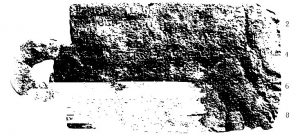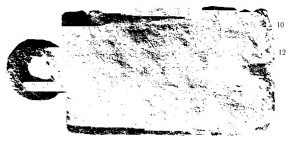

1-5) The year (is) 100 (and) 20 (and) 8, (the month) Vaiśākha, the day 7, while Paramadaivata Paramabhaṭṭārakkamahārājādhirāja the prosperous Kumāragupta is the lord of the earth; (and) while Koṭivarṣa district is running on with the rule of Cirātadatta, Uparika in the Puṇḍravardhana province, selected by His (Majesty’s) feet; and while KumārāmātyaVetravarman, appointed by him (Cirātadatta), is administering the Board of the Town, presiding over the Nagara-śreshṭhin Dhṛtipāla, the Sārthavāha Bandhumitra, the Prathama-kulika Dhṛtimitra, (and) the Prathama Kāyastha Śāmbapāla.
5-7) Whereas …. has applied: “Deign to give (a plot of land) according to the customary (anuvṛitta) rules (maryādā) of perpetual (nīvī Law) in respect of (land) not yielding anything (aprada) for instituting my five great sacrifices (pañcha-mahāyājña),”
7-11) “After receiving this application, is being resolved that it might be granted according to the determination of the record-keepers Riśidatta, Jayanandin and Vibhudatta, five droṇas of land were given together with drinking-places and water-drawing wheels, on acceptance of two dīnāras, at the established rate of three dīnāras of each kulyavāpa, in the western quarter, in the waterless region destitute of cows. These droṇas (of land) should be respected by the future administrators, considering (them) to be a religious gift.”
11) And there are these two stanzas connected with grants of land.
Verse 1) Carefully preserve the land that has already been given to the twice-born (Brāhmaṇas) Yudhiṣṭhira, the best land-owners. Preservation is more meritorious than grant (of land).
Verse 2) Land has been granted, and will again and again be granted by many. (But) the fruit (of such grant) belongs to whosoever possesses the earth at any time.